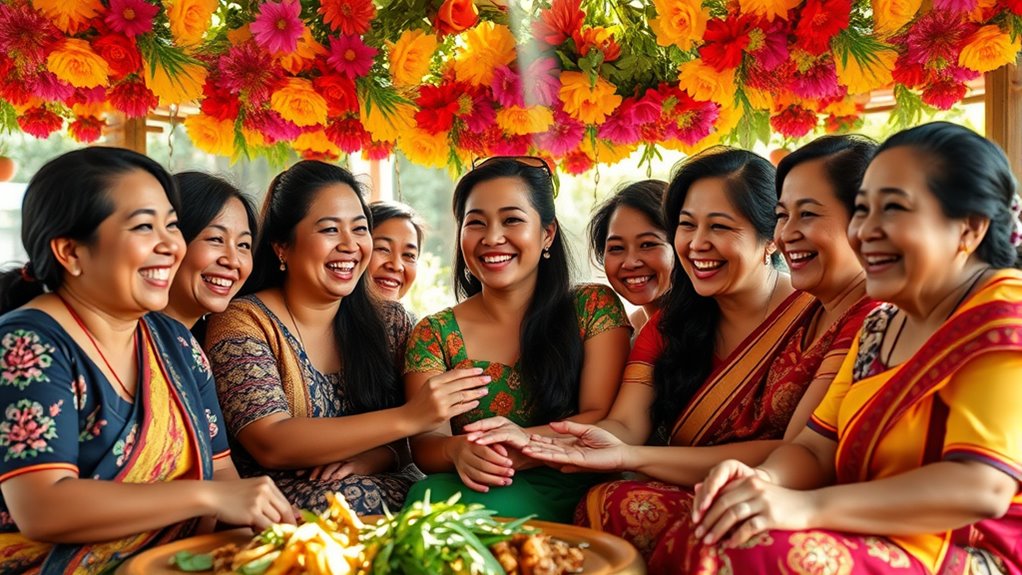Filipina women value pakikisama in relationships because it fosters harmony, emotional support, and social cohesion. This cultural principle encourages you to prioritize group unity over individual desires, helping you maintain strong connections with family and friends. By promoting empathy and collaboration, pakikisama creates a sense of belonging and well-being. However, it can also pressure you to conform, which might complicate personal integrity. There’s much more to explore about how this influences relationships.
Key Takeaways
- Filipina women value pakikisama as it fosters harmony and strengthens emotional ties within relationships, enhancing their sense of belonging.
- Prioritizing group unity over individual interests, pakikisama helps maintain family cohesion and encourages conformity to family expectations.
- In friendships, pakikisama promotes conflict avoidance, creating supportive communities that nurture strong connections through shared experiences.
- The emphasis on mutual support through pakikisama alleviates stress from interpersonal conflicts, ensuring emotional well-being in relationships.
- Filipina women use pakikisama to navigate social dynamics, balancing respect for group norms with the need for personal integrity.
Understanding the Concept of Pakikisama

Pakikisama, at its core, is about fostering harmony in relationships. This Filipino value encourages you to prioritize social cohesion and cooperation, often placing group unity above personal interests.
Understanding pakikisama means recognizing its importance in maintaining friendly and welcoming interactions. It’s deeply embedded in Filipino culture and psychology, helping to forge strong community ties. Cultural heritage preservation ensures that traditions and values are passed down to future generations.
When conflicts arise, pakikisama promotes yielding to majority decisions, ensuring peace over discord. You also experience a shared identity known as kapwa, enhancing your sense of belonging.
By embracing this concept, you contribute to a supportive environment where mutual respect and cooperation thrive, reinforcing the interconnectedness that defines Filipino society.
Ultimately, pakikisama shapes your interactions, fostering a spirit of togetherness.
The Role of Pakikisama in Family Dynamics

In family dynamics, the concept of pakikisama plays an essential role in shaping interactions and relationships. It emphasizes maintaining harmony, encouraging you and your family members to sidestep conflict. While this promotes a peaceful environment, it can also create pressure to conform to family expectations, sometimes sacrificing your personal desires.
You might notice issues get suppressed, resulting in passive-aggressive behavior instead of open discussions. Pakikisama also encourages involving extended family in decision-making, which can complicate personal choices. This interdependence reinforces the importance of community, but it may challenge your individuality.
Balancing these dynamics requires careful navigation to maintain both family unity and personal aspirations.
Pakikisama and Its Impact on Friendships

While managing friendships, understanding the importance of pakikisama can greatly enhance your connections. This concept, which means “getting along,” fosters social harmony and prioritizes group unity over individual desires. By valuing pakikisama, you avoid conflicts, allowing your friendships to flourish without unnecessary confrontations. This practice is similar to how couples who work together report higher satisfaction in their relationships, highlighting the value of collaborative efforts.
This conflict avoidance helps maintain long-lasting bonds, even if it means setting aside personal opinions at times. Empathy plays a crucial role, as being sensitive to your friends’ feelings deepens your connections. Engaging in shared activities, like group gatherings or collaborative projects, strengthens these ties further. Ultimately, friendships rooted in pakikisama create a supportive community, enhancing emotional well-being and trust, making your relationships more fulfilling and meaningful. Additionally, just as networking and industry knowledge are important in acquiring clients for a business, building strong relationships through pakikisama can lead to a more connected and supportive social network.
Workplace Cooperation and Teamwork

When you embrace the concept of pakikisama in the workplace, you create a foundation for effective cooperation and teamwork. This approach enhances productivity by promoting harmony and minimizing conflict among colleagues. By fostering an environment that values mutual respect, you empower team members to communicate openly and resolve conflicts constructively. Additionally, demonstrating strong communication skills can play a crucial role in ensuring that everyone feels heard and valued.
By prioritizing group unity over individual achievements, you foster a sense of community that strengthens interpersonal relationships. Mutual respect and empathy become the norm, leading to smoother interactions and a more cohesive team dynamic. Additionally, understanding the causes of difficult behavior can help address any underlying issues that may arise during teamwork. Establishing a cooperative co-parenting plan can serve as a model for collaborative efforts in the workplace.
You’ll find that collaboration takes precedence over competition, allowing everyone to work toward shared goals. This supportive atmosphere not only boosts job satisfaction but also builds trust and strong connections among team members, reflecting the Filipino values of cooperation and community that are essential for a thriving workplace. Additionally, adopting time management skills can further enhance team efficiency by ensuring that tasks are completed on schedule, benefiting the overall group performance.
The Importance of Social Acceptance
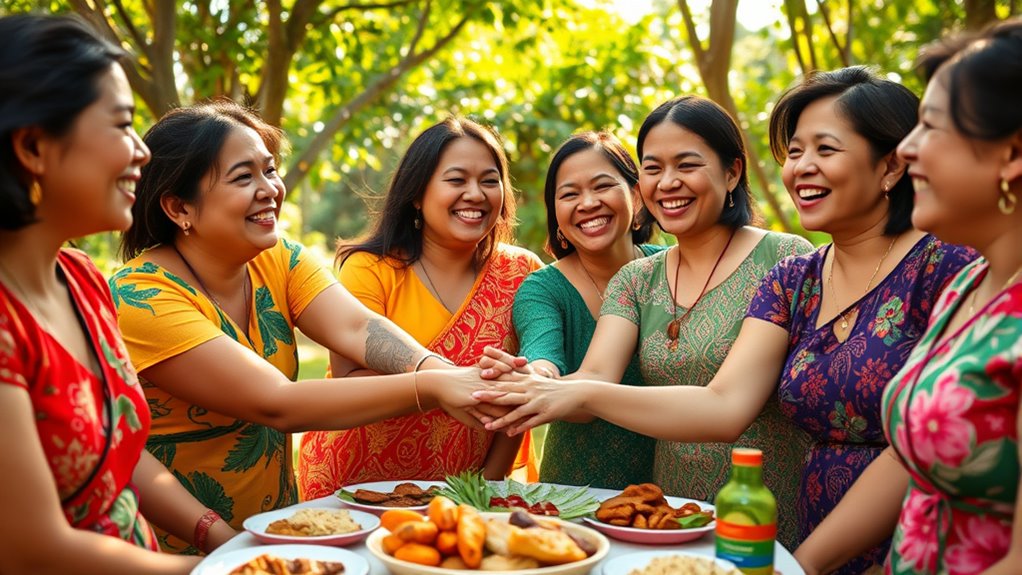
Understanding the importance of social acceptance can greatly enhance your relationships and overall well-being. By embracing pakikisama, you prioritize harmony and cooperation, fostering a sense of belonging within your community.
This cultural value emphasizes group unity over individual achievements, encouraging mutual support that strengthens your connections with others. In social settings, yielding for the sake of peace becomes essential, as it promotes understanding and respect among peers.
By practicing pakikisama, you contribute to a cohesive environment where everyone feels valued. Additionally, this approach can alleviate stress from interpersonal conflicts, enhancing your mental health.
Ultimately, valuing social acceptance through pakikisama creates an atmosphere of camaraderie, enriching both your personal relationships and your sense of community.
Balancing Individuality and Group Harmony
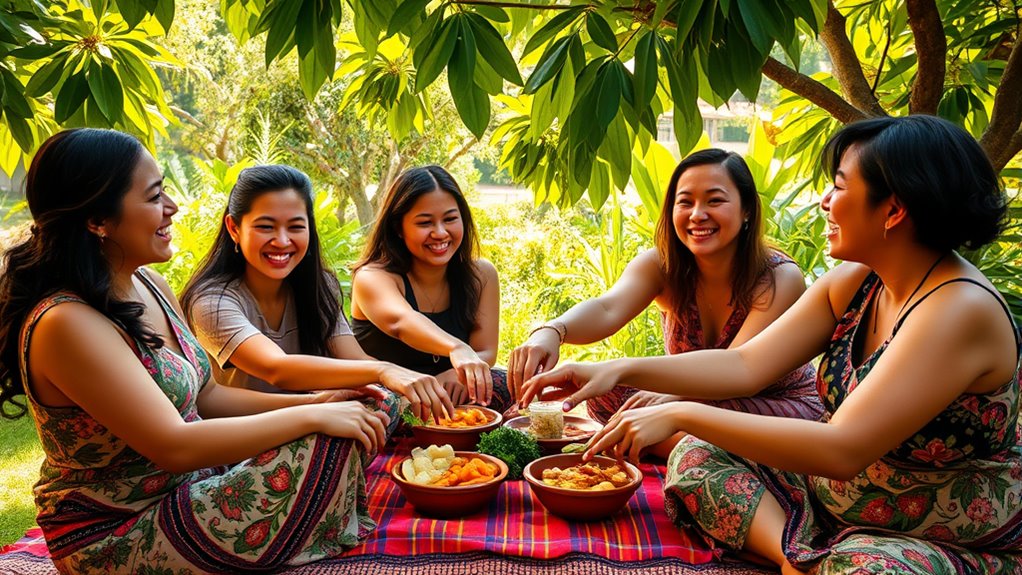
Balancing individuality and group harmony is essential for building meaningful relationships in a community. You often find yourself maneuvering the delicate dance between expressing personal desires and maintaining group peace.
Pakikisama encourages you to prioritize harmony, sometimes leading to the suppression of your own goals. This cultural value shapes your interactions, urging you to conform to social expectations and avoid conflict.
Pakikisama promotes harmony, often at the expense of personal aspirations, guiding you to align with social norms and sidestep discord.
In family settings, you might yield your preferences to guarantee that everyone feels respected and united. While it’s important to stay true to yourself, adapting to group dynamics fosters cooperation and collective problem-solving.
Embracing this balance can enrich your relationships, allowing both your individuality and the community’s harmony to flourish together.
Emotional Connections Fostered by Pakikisama

While steering through relationships, you’ll find that emotional connections fostered by pakikisama play an essential role in creating a sense of belonging and unity.
This approach emphasizes empathy and understanding, allowing you to appreciate others’ perspectives, which enhances group cohesion. By prioritizing collective well-being, you develop respect and consideration for those around you, fostering social harmony.
This strong sense of community ties goes hand-in-hand with trust and loyalty, promoting long-term commitment among individuals. Emotional support becomes crucial, as it nurtures friendships and guarantees harmony within the group.
Navigating Conflicts With Grace
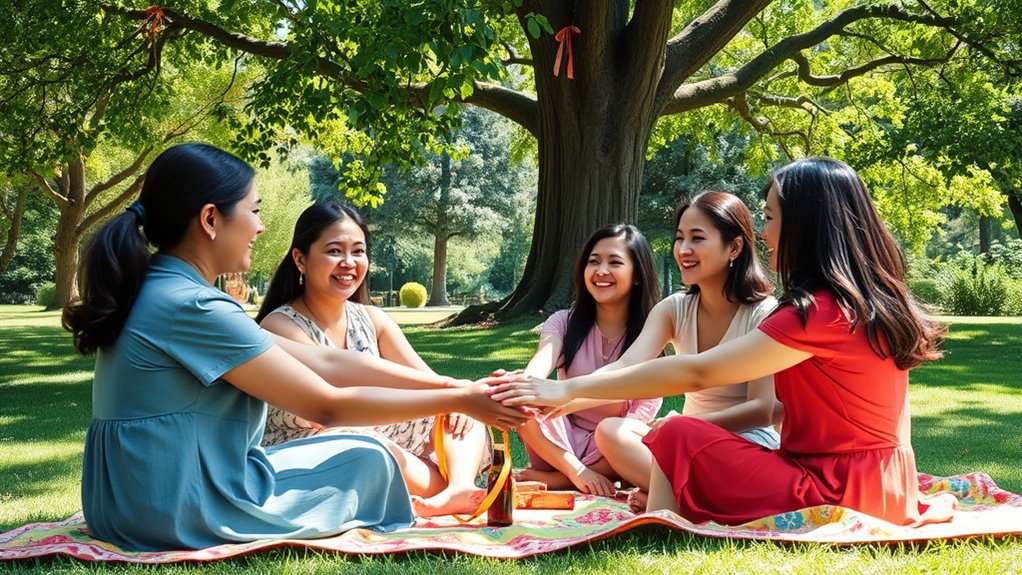
Steering through conflicts gracefully requires a deep awareness of cultural nuances, especially when it comes to pakikisama. You often find yourself prioritizing group harmony over personal opinions, feeling the pressure to avoid direct confrontation.
This approach can lead to suppressing your own views, especially within peer groups where opposing the majority feels intimidating. Values like kapwa and hiya reinforce this dynamic, encouraging you to maintain social respect.
Suppressing your own views in favor of group harmony can be daunting, but kapwa and hiya guide you towards maintaining social respect.
While social harmony is essential, it’s also crucial to practice compromise, ensuring everyone’s voice is acknowledged. Non-verbal cues become your ally in conveying alignment with group norms, allowing you to navigate conflicts while fostering unity.
Ultimately, balancing your individuality with the collective needs strengthens your relationships.
The Influence of Cultural Roots on Relationships
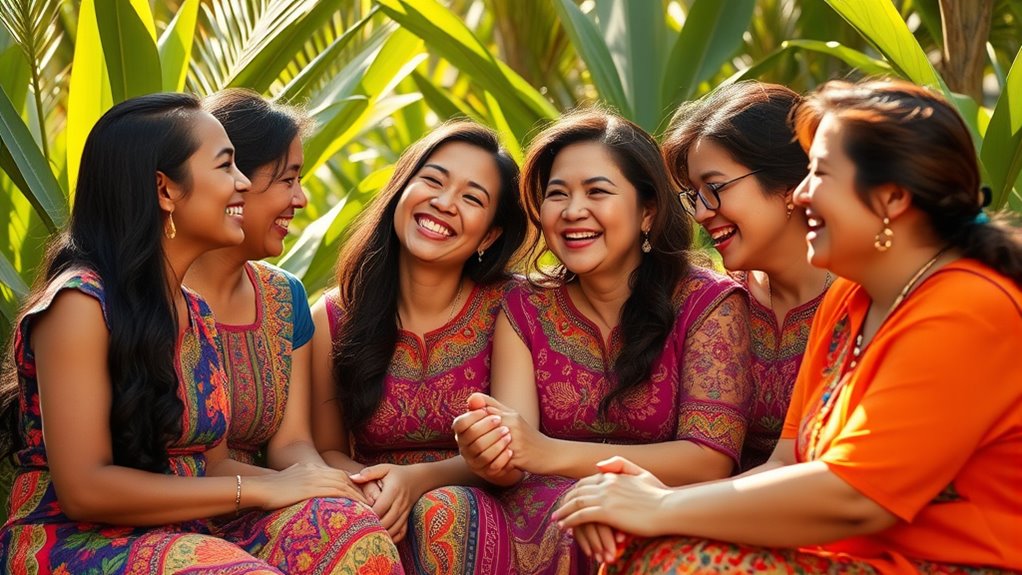
Understanding how cultural roots shape relationships is crucial, especially in a society where values like pakikisama play a significant role. This value promotes social harmony and emphasizes cooperation, often prioritizing group cohesion over individual achievements.
In Filipino culture, pakikisama fosters a shared identity, enhancing bonds and community cooperation. You’ll notice that this emphasis on harmony often leads to compromise, acceptance, and loyalty in your relationships. However, it can also suppress individuality if taken to extremes.
Within families, pakikisama guarantees unity and respect, while in workplaces, it promotes teamwork and strong professional relationships. As urbanization continues to influence these dynamics, you may find that pakikisama adapts, yet its core essence remains crucial in nurturing connections.
The Challenge of Maintaining Integrity in Social Settings
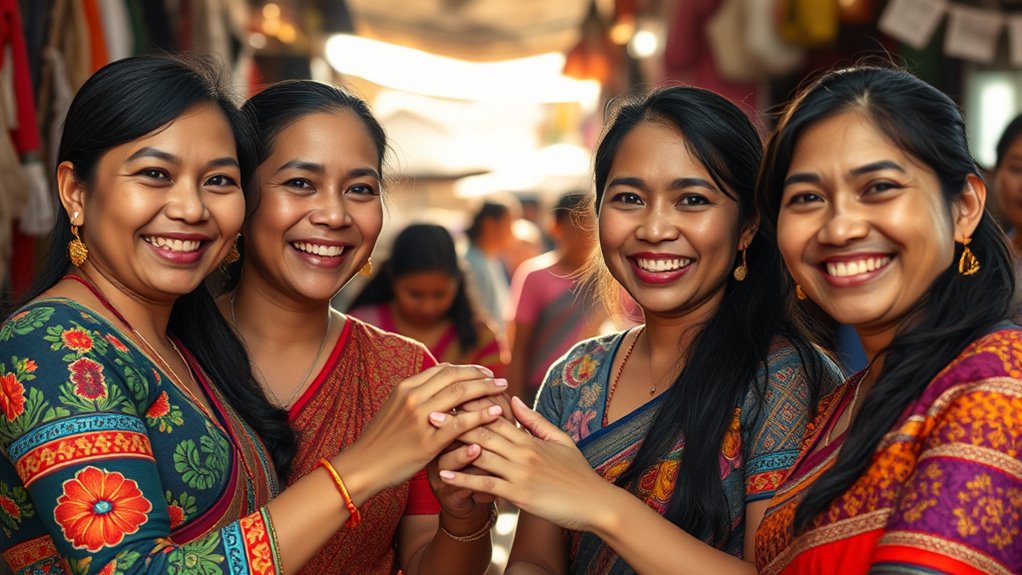
Pakikisama plays an essential role in fostering relationships, but it can also complicate the challenge of maintaining integrity in social settings.
You might find yourself avoiding conflicts to keep the peace, which can compromise your personal values. Social pressure to conform often overshadows honesty, making it tough to assert your true thoughts.
While prioritizing group harmony, you may sacrifice your individuality, ultimately affecting your integrity. In workplaces, the expectation to maintain harmony might deter you from speaking up for your needs.
Prioritizing group harmony can compromise your individuality and integrity, especially in workplace dynamics.
Balancing respect and empathy with personal integrity is vital but challenging. Remember, constant compromise can lead to long-term emotional consequences, so aim to navigate these social dynamics while staying true to yourself. Understanding the narcissist-borderline dynamic can provide insights into how to manage relationships effectively.
Frequently Asked Questions
How Does Pakikisama Affect Romantic Relationships Among Filipina Women?
Pakikisama greatly affects romantic relationships among Filipina women by prioritizing harmony over conflict.
You often find yourself making compromises to guarantee peace, valuing shared decision-making with your partner. While this fosters unity, it can also lead to sacrificing personal desires for the sake of relationship stability.
Balancing your own needs with cultural expectations may challenge your personal growth, but it reinforces community ties and deepens emotional connections in your relationships.
Can Pakikisama Lead to Peer Pressure in Social Settings?
Can you imagine how group dynamics shape your social interactions?
Pakikisama can certainly lead to peer pressure in social settings. You might find yourself conforming to group norms, even if they clash with your beliefs. This pressure often encourages you to prioritize harmony over honesty, sometimes silencing your voice.
While it fosters strong bonds, it can also stifle individuality, making it hard to express dissenting opinions or pursue personal growth.
How Does Pakikisama Influence Parenting Styles in Filipino Families?
Pakikisama plays a significant role in shaping parenting styles in Filipino families.
You’ll notice that parents often prioritize harmony over independence, encouraging kids to rely on family for support. This fosters emotional intelligence and respect for elders, but it can also lead to dependency in decision-making.
Are There Generational Differences in Valuing Pakikisama Among Filipinas?
Yes, there are generational differences in valuing pakikisama among Filipinas.
Older generations often prioritize harmony, conformity, and community ties, while younger Filipinas lean toward individuality, self-expression, and personal growth.
You might find that traditional views emphasize collective well-being, while modern perspectives encourage balancing social expectations with personal values.
This shift reflects changing norms, where younger women navigate the delicate interplay between maintaining harmony and asserting their identities in a rapidly evolving society.
How Can Pakikisama Be Misinterpreted by Outsiders?
Outsiders often misinterpret *pakikisama* as mere submissiveness, overlooking its deeper significance.
When you see someone prioritizing harmony and group acceptance, it might seem like conformity. However, it’s about fostering strong relationships and avoiding conflict.
Without immersion in Filipino culture, you might miss the balance between individual desires and collective interests.
Understanding *pakikisama* requires you to appreciate its role in promoting social unity, rather than just viewing it through a lens of compliance.
Conclusion
To sum up, recognizing the role of pakikisama in Filipina relationships reveals the power of partnership, patience, and positivity. By fostering friendships and family ties, you create a community of care that thrives on mutual respect. As you navigate social settings, remember that maintaining integrity while embracing inclusivity can lead to deeper emotional connections. Ultimately, the charm of pakikisama cultivates harmony, helping you build bonds that blossom beautifully in every aspect of life.
